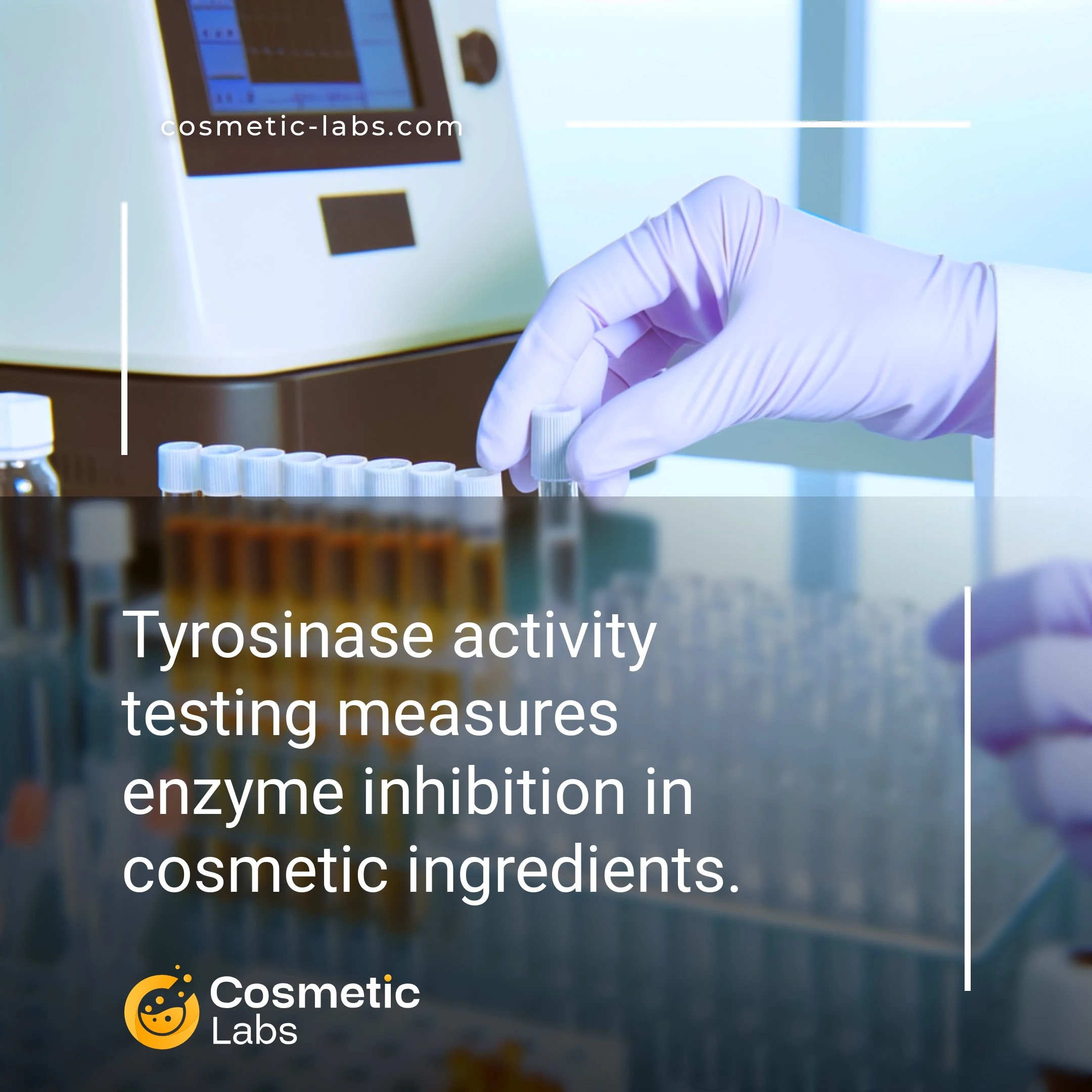Tyrosinase Activity Testing Services for Cosmetic Labs

What is Tyrosinase activity testing?
Tyrosinase activity testing services measure how effectively cosmetic ingredients inhibit the enzyme responsible for melanin production in skin cells. Labs use standardized assays with mushroom tyrosinase or human melanocytes to test whitening actives, providing IC50 values that quantify inhibition potency at different concentrations. This data helps you validate skin-lightening claims and optimize formulations before clinical trials, giving you concrete evidence of your product’s depigmentation potential.
Why do you need this service?
Cosmetic labs use tyrosinase inhibition assays to validate whitening claims for skin brightening serums, spot treatments, and anti-aging formulations before market launch. Teams measure ingredient potency against kojic acid and arbutin standards, generating quantifiable efficacy data that supports regulatory submissions and marketing claims while identifying optimal active concentrations for maximum melanin reduction.
Who provides Tyrosinase activity testing services?
All cosmetic labs providing Tyrosinase activity testing services
There is no company providing these services at the moment.
Tyrosinase Activity Testing Services
Tyrosinase activity testing measures how effectively your cosmetic ingredients inhibit the enzyme responsible for melanin production. This biochemical assay provides quantitative data on your product’s skin-lightening potential, complementing broader pigmentation efficacy studies with precise enzyme inhibition measurements.
In Vitro Enzyme Inhibition Assays
Labs run standardized tyrosinase inhibition assays using mushroom tyrosinase or human recombinant enzymes. These tests measure IC50 values – the concentration needed to inhibit 50% of enzyme activity. Results typically show inhibition percentages at multiple concentrations, helping you determine optimal ingredient dosing.
Testing protocols include:
- Dose-response curves from 0.1% to 10% concentration
- Positive controls using kojic acid or arbutin
- Kinetic analysis for mechanism of inhibition
- Stability testing under various pH conditions
Raw Material Screening and Formulation Testing
Beyond single ingredients, labs test complete formulations and raw material combinations for synergistic effects. This approach identifies how different whitening agents interact and whether your final product maintains tyrosinase inhibition activity. Many labs also screen natural extracts for novel inhibitory compounds.
Services include comparative analysis against market benchmarks and structure-activity relationship studies for ingredient optimization. Results help you select the most effective whitening actives and justify concentration levels in your formulations.
Connect with specialized labs on our platform to discuss your tyrosinase testing requirements and receive detailed protocols tailored to your specific ingredients or formulations.
Practical Applications of Tyrosinase Activity Testing Services
Cosmetic labs use tyrosinase activity testing services to validate skin brightening claims and optimize formulations before market launch.
Skin Brightening Product Development
Beauty brands rely on tyrosinase inhibition assays to screen active ingredients and validate whitening formulations. Labs test kojic acid, arbutin, and vitamin C derivatives using standardized protocols that measure enzyme activity reduction. Testing protocols typically deliver results within 5-7 days, allowing teams to compare ingredient effectiveness and optimize concentrations.
Product developers use these results to support marketing claims and regulatory submissions. Quantitative data from tyrosinase assays helps brands demonstrate measurable skin brightening benefits to consumers and regulatory bodies.
Quality Control and Batch Testing
Manufacturing teams implement tyrosinase testing for raw material verification and finished product consistency. Labs analyze ingredient batches to confirm tyrosinase inhibition potency meets specifications before production. This prevents formulation variations that could affect product performance.
Quality assurance protocols include testing finished products against established benchmarks. Teams track tyrosinase activity data across production runs to identify formulation drift and maintain consistent product efficacy throughout shelf life.
| Testing Application | Typical Timeframe | Key Metrics | Industry Use |
|---|---|---|---|
| Ingredient Screening | 3-5 days | IC50 values, % inhibition | Formulation development |
| Product Validation | 5-7 days | Comparative efficacy | Marketing claims support |
| Batch Testing | 2-3 days | Activity consistency | Quality control |
| Stability Studies | Ongoing | Activity retention | Shelf life validation |
Ready to validate your skin brightening formulations? Connect with experienced cosmetic labs on our platform to discuss your tyrosinase testing requirements and accelerate your product development timeline.
